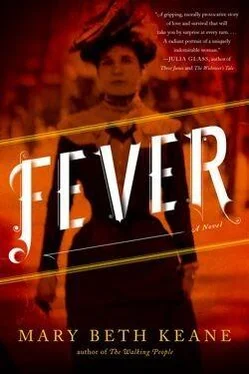“Thank you,” she said. “It’s really lovely. Tell your wife thank you, too.”
“I will.”
• • •
The next morning, she opened the door of her hut to find her newspaper had been opened and refolded so that an article from the city section was on top. “Typhoid Mary to Be Released by Week’s End” the headline read.
“Typhoid Mary,” she whispered as she reached for the paper. Unlike the other names they’d given her — most often the Germ Woman, a title that seemed and felt anonymous, something she could easily disown — Typhoid Mary had a ring to it, and as she studied the boldface type of the paper in her hand she felt it settle on her. She felt it stick.
Word spread quickly around the island. The nurses came in pairs and groups of three to say good-bye. Maybe they had more sympathy than she’d credited, Mary considered as they bade her best wishes and good luck. Maybe she’d been kinder than she thought. Even Dr. Albertson made his way down the path one afternoon. “Good luck to you, Mary,” he said, and continued on his way for a walk.
John Cane avoided her. One morning, when it snowed, he cleared her step while she was in the hospital signing forms, and she could see by the footprints he left that he was avoiding the path. “John!” she called to him another morning. She was walking from the lighthouse and he was over by the nurses’ dormitory, shaking salt on the narrow road. But he didn’t hear her, or wouldn’t listen, and by the time she arrived at the place where he’d been standing, he was nowhere in sight.
Finally, on Thursday afternoon, she caught him walking near her door. “John!” she called out from her step. She waved him over. He seemed to hesitate, but then turned onto the path that led to her hut.
“Are you avoiding me?” she asked, smiling, hoping to disarm him. She didn’t want to leave him angry with her, and she didn’t want to leave without him accepting that he had no reason to be angry.
“Nope.”
“Do you know I’m leaving tomorrow?”
“I heard something about that.”
“Well, aren’t you going to say good-bye?”
“I was going to wait.” He stamped his boots and left treads of snow outside her door. “You still have another day. Don’t get ahead of yourself.”
“John—”
“Besides, it’s like you said, those people are tricky and they might change their minds at the last minute, and then won’t we all feel a bit silly for having said good-bye?”
“They won’t change their minds. It’s all signed and sealed. I have a job waiting for me.”
“Well, good. That’s good.”
Mary understood what was eating him, but there was no possible way to say it. After he’d pinned her for not asking him any personal questions, she’d made sure to pose a few, now and again, in light conversation, and over the months she’d learned that he had no wife, no children, and lived on East Ninety-Eighth Street with his younger brother, who was bigger and stronger than John, but who was not right in his mind, and could not hold a job because he was prone to fits so violent that he’d once bitten clear through his own tongue. This brother tried to care for John like a wife, doing the cleaning, the shopping, the cooking, but he was not a wife, not nearly a wife, and Mary also understood without ever needing to ask the question that what John wanted his whole life long was a real wife, and he had not given up.
“I want to tell you something,” John said, and Mary cursed herself for letting it come to this. “I want to tell you that I don’t think things are so bad here on North Brother. I think it’s a pretty spot and your bungalow is sound, if a little on the damp side, but show me a building that isn’t. And I think you have to admit you’ve had pretty good company when you’ve sought it. You’ve had someone to talk to, is what I mean. Would you agree?”
“I agree completely.”
“But you still want to leave.”
“Yes.”
“Well, then I want to tell you something else. That Alfred who came here that time. Your man. Yes, I know you said he’s not your man anymore, and yes I know you didn’t put it like that, but I can put two and two together, and what I want to say is that Alfred is not a good character. I don’t mean because of what the papers said about the way you lived, or any of that. I just mean man to man, I can tell a good one from a bad one, and I don’t trust that one to stay away from you once you’re over there again. Remember I said that, and remember that he didn’t have the patience to wait for you while you were here, like any other man would. Like a few other men I can think of would have done without a doubt. And now look where his impatience got him. Don’t forget that, Mary, once he comes around.”
“I won’t forget,” Mary promised, and all the humor she’d felt a moment earlier, all the warmth toward her friend, disappeared, and instead she felt her stomach tighten, her head fill up with electric sparks.
“Well, I had to say it,” John said, and now, his burden lifted, he seemed like the old John, at home with himself and with the door frame of Mary’s bungalow. “And maybe we can visit sometime, over there, and I can tell you the news of North Brother. We can go for a walk or something.”
“John.” She stepped forward and hugged him, and felt where the top of his head met with her ear. She couldn’t help it, she felt it was like hugging a child, a solid, muscular child, but still a child, a child’s narrow shoulders, a child’s way of clinging to her when he wants comfort, and she couldn’t muster up a single morsel of attraction toward him. “Let’s do that.”
When Mary was seventeen but passing herself off as twenty-five or twenty-six, turning from the sidewalk and pushing the heavy wrought-iron gate that led to the front door of a house like the Warrens had rented in Oyster Bay, or the Bowens had on Park Avenue, would have made her body a hard knot of dread. It was worse when the woman of the house was young, newly married, maybe only eighteen or twenty herself. Girls of twenty know by instinct who is at least their own age and who is younger, and Mary would compensate by marching into the kitchen with authority, maybe even a little disdain. She’d thicken her accent like a gravy on the stove and hope that would explain to them why she seemed so young. A cultural difference, Mary could see the young mistress thinking. This is the way Irish are, I suppose. Once, when she arrived to cook for the Hill family on Riverside Drive, the mistress had taken one look at her and told her outright that she didn’t believe Mary’s age or experience. Mary had just turned eighteen, and had slowly been getting jobs the agency didn’t know about. Aunt Kate would hear about something from a friend, or Mary would answer an ad in the newspaper. In addition to a home so large that it could have housed a dozen families, the Hills had three carriages, six horses, and a pair of Shetland ponies for the children, who were not yet old enough to ride them. Mrs. Hill told Mary to be on her way.
“I only look young,” Mary insisted, feeling as she said it exactly what she was: a skinny child who hadn’t eaten a proper meal since her last employment. “You’ll get no one else out here today. I might as well make dinner before I go.”
Mrs. Hill hesitated. “I am hungry,” she admitted, and patted her considerable belly. “Only porridge this morning.”
After showing Mary to the kitchen, Mrs. Hill left her alone to create something wonderful out of the bland bits and pieces that had been left behind by the previous cook and the pale chicken carcass the porter had been sent out to fetch that morning. Mary found flour, butter, eggs, raisins, rosemary, three old apples she knocked on and then tested for juice with her front teeth. An hour later she brought Mr. and Mrs. Hill, along with their two children, plates of walnut and raisin chicken salad, with fresh bread and baked apples on the side. She stayed at the Hills’ until her true age was exposed by a porter who’d overlapped with her at a job in Brooklyn Heights. For the next few months Mary had to go back to washing and ironing, giving her the feeling that life was just one long, narrow road, with no turns, no peaks or valleys.
Читать дальше












